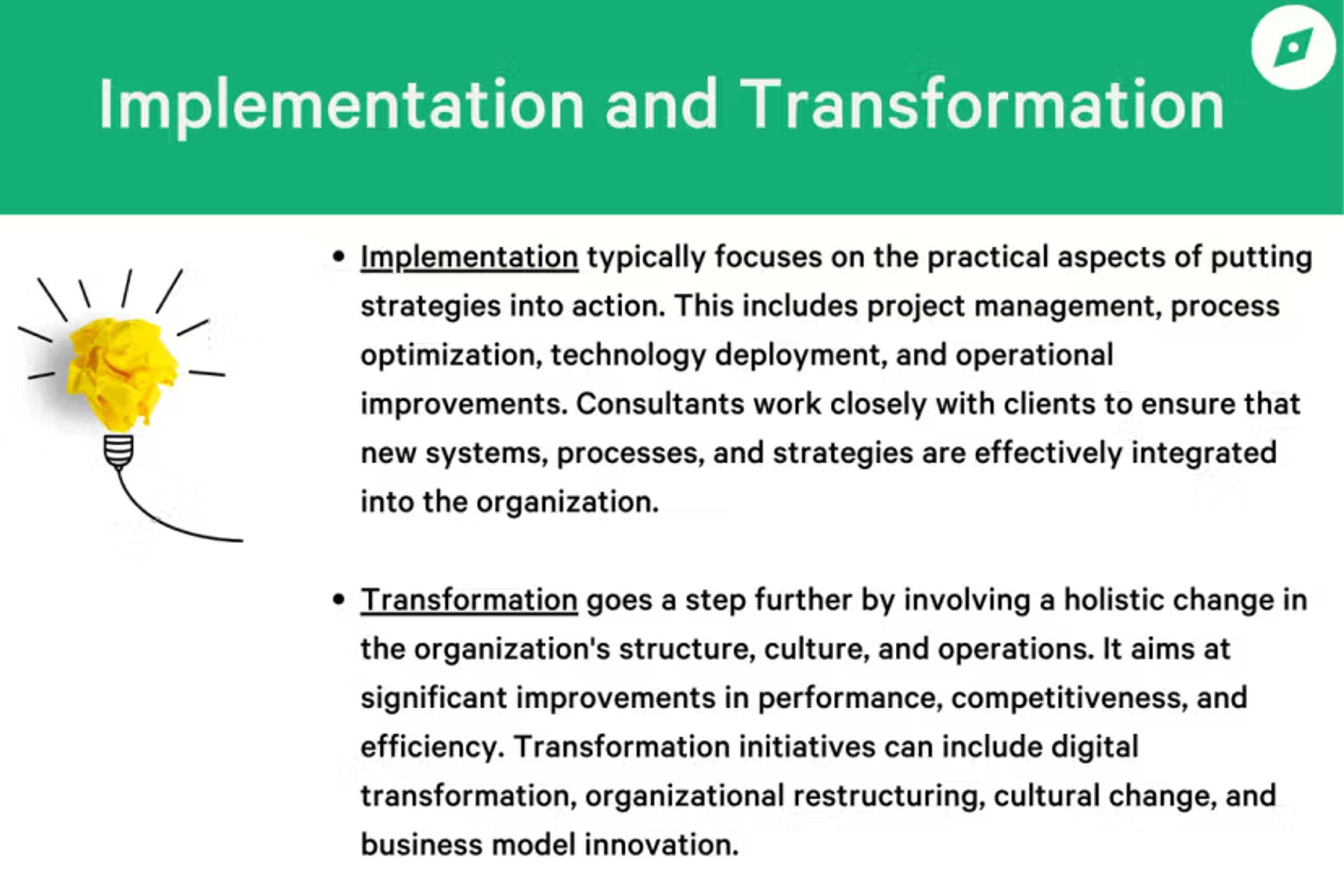MBB vs. Big 4 Consulting Firms: What's the Difference?
Explore the key differences between Big 4 consulting firms and MBB. Understand their unique services, work cultures, career paths, and which aligns with your goals.
Posted June 13, 2025

Join a free event
Learn from top coaches and industry experts in live, interactive sessions you can join for free.
Table of Contents
When it comes to consulting, two groups of firms dominate the industry: MBB (McKinsey, Boston Consulting Group, and Bain & Company) and the Big Four (Deloitte, PwC, EY, and KPMG). These global professional services firms have evolved from traditional accounting roles into multifaceted service providers, offering a wide range of services including tax, audit, compliance, and consulting.
These firms represent the most prestigious names in consulting and advisory services globally. However, their differences are significant in terms of focus, service offerings, reputation, and career prospects.
In this guide, we’ll provide an in-depth comparison of these two groups, including their structure, work, and opportunities for aspiring consultants.
Who Are the MBB Management Consulting Firms?
The MBB firms—McKinsey & Company, Boston Consulting Group (BCG), and Bain & Company—are widely regarded as the leading consulting firms in the world. These firms specialize in strategy consulting and focus on solving high-level, complex business problems for C-suite executives and senior leadership.
McKinsey & Company
| Revenue | $15 billion+ |
| Employees | 38,000+ |
| Offices | 144 across 65 countries |
McKinsey, founded in 1926, is considered the pioneer of strategy consulting. Known for its deep industry expertise, the firm advises global organizations, governments, and non-profit organizations on challenges like business strategy, operational efficiency, and market expansion. McKinsey has earned the nickname “The CEO Factory” due to its reputation for developing business leaders who later become executives at companies like Google and Facebook.
When comparing McKinsey's reputation and prestige with other top firms, McKinsey, BCG, and Bain (collectively known as MBB) are often highlighted for their competitive edge in the consulting industry.
Boston Consulting Group (BCG)
| Revenue | $12 billion+ |
|---|---|
| Employees | 21,000+ |
| Offices | 90+ in 50 countries |
BCG, founded in 1963, focuses on strategic consulting and is known for its innovative approaches to solving client problems. The firm emphasizes strategy practices such as organizational design, market analysis, and digital transformation. BCG consultants are often sought after for their ability to navigate market dynamics and deliver actionable insights.
Bain & Company
| Revenue | $5.8 billion+ |
| Employees | 15,000+ |
| Offices | 64 in 39 countries |
Founded in 1973, Bain stands out as an MBB firm known for its focus on working closely with private equity firms. The firm has a reputation for being results-oriented, emphasizing implementation projects alongside strategy work. Bain consultants are frequently involved in diligence work for private equity investors, guiding acquisitions, and portfolio management.
Who are the Big 4 Consulting Firms?
The Big 4 consulting firms, known for their vast influence in the consulting industry, include PricewaterhouseCoopers (PwC), Ernst & Young (EY), Klynveld Peat Marwick Goerdeler (KPMG), and Deloitte. These accounting firms, initially established for auditing and tax services, have evolved to become multifaceted giants offering services in risk assurance, tax, legal, and consulting. With a workforce ranging between a quarter and a half a million employees globally, they represent a significant portion of the market, providing a broad spectrum of professional services.
Deloitte
| Revenue | $59 billion+ |
| Employees | 412,000+ |
| Focus Areas | Audit services, technology consulting, and digital transformation |
Deloitte’s origins trace back to 1845 when William Welch Deloitte founded his accounting practice in London. This global management consulting firm emerged in the 1980s, following the merger with Touche Ross, to offer a broader range of advisory services beyond traditional accounting. Over the decades, Deloitte Consulting expanded its consulting practice globally, focusing on strategy, operations, technology, and human capital consulting.
The firm has continuously adapted to the changing business landscape, incorporating digital transformation and innovation to help clients navigate complex challenges. Today, Deloitte Consulting is renowned for its expertise and impact across various industries, maintaining a strong presence in over 150 countries.
PwC (PricewaterhouseCoopers)
| Revenue | $50 billion+ |
| Employees | 328,000+ |
| Focus Areas | Audit, tax, and consulting services |
PwC’s history began in 1849 with Samuel Price's accounting practice. Over time, the firm expanded its services, culminating in the 1998 merger of Price Waterhouse and Coopers & Lybrand to form PwC. The consulting division became a vital component, offering advisory services in strategy, technology, operations, and human capital. In 2002, PwC Consulting was sold to IBM and rebranded as IBM Global Business Services, but PwC re-entered the consulting market in 2009 by acquiring several advisory firms.
Today, PwC Consulting is a global leader in management consulting, known for helping clients solve complex business challenges and drive transformation across various industries. Operating in over 150 countries, PwC Consulting delivers insights and solutions that enhance business performance and create value.
EY (Ernst & Young)
| Revenue | $45 billion+ |
| Employees | 365,000+ |
| Focus Areas | Audit and consulting services |
EY (Ernst & Young) has significantly evolved since its 19th-century origins. The accounting firm traces its roots to Harding & Pullein in 1849 and Ernst & Ernst in 1903, with the merger of Ernst & Whinney and Arthur Young & Co. forming Ernst & Young in 1989. EY Consulting emerged as a distinct service line, offering expertise in strategy, technology, operations, and human capital.
In 2000, EY's consulting arm was sold to Capgemini, but the firm re-established its consulting services through strategic acquisitions and organic growth. Today, EY Consulting is a global leader, providing comprehensive advisory services that help clients address complex business challenges and drive innovation. With a presence in over 150 countries, EY Consulting leverages deep industry knowledge and cutting-edge solutions to enhance business performance and deliver value.
KPMG
| Revenue | $35 billion+ |
| Employees | 265,000+ |
| Focus Areas | Audit services and Advisory services. |
KPMG has its origins in the late 19th century with the founding of Klynveld, Peat, Marwick, and Goerdeler, which later merged to form KPMG in 1987. Initially focused on accounting and auditing, KPMG expanded into consulting, providing advisory services in strategy, technology, risk, and operations.
In 2002, KPMG Consulting was rebranded as BearingPoint but the KPMG name returned to the consulting sector in 2009. Today, KPMG Consulting is a global leader, offering comprehensive solutions to help clients navigate complex business challenges and drive innovation, with a presence in over 150 countries.
MBB vs. Big 4 Consulting Firms
1. Service Offerings
MBB firms specialize in strategy consulting, focusing on business strategy, market-entry, and competitive positioning. Their projects tend to be high-stakes, strategic, and limited in scope.
Big Four firms, on the other hand, offer a broader range of services. In addition to strategy consulting, their consulting practice excels in audit services, tax practice, risk assurance, and transaction services. Their projects often include implementation projects, working alongside clients to execute strategies.
2. Client Base
MBB firms primarily work with high-profile clients, including C-suite executives, large multinational corporations, and government entities. The projects typically involve strategy work and demand innovative, high-level solutions.
The Big Four serves a diverse set of clients, from non-profit organizations to small and medium enterprises (SMEs). Their client base is broader, often including middle managers and smaller businesses.
3. Reputation
MBB firms are considered the most prestigious firms in the consulting industry, often ranking higher in surveys for reputation and influence. They are renowned for working on high-profile clients’ most critical issues.
4. Implementation and Transformation
Implementation and transformation refer to the process of executing strategic plans and driving comprehensive changes within an organization to achieve specific business objectives. This involves translating high-level strategies into actionable plans, managing change, and ensuring that the desired outcomes are realized.

Professional Growth and Exit Opportunities
Career progression in management consulting varies depending on the firm's focus and an individual’s performance. MBB firms are known for their highly selective recruitment process, primarily hiring from top-tier universities. This exclusivity reinforces their strong reputation and justifies their premium service fees, which can range from $500,000 to $1,250,000 per strategy engagement. Many MBB alumni transition into executive roles, such as CEOs or CFOs, due to the firm's strong industry connections and reputation.
Read: The Highest-Paying Management Consultant Firms
The Big 4, while not as exclusive, still provides significant career opportunities. Their projects are often higher in volume, which may sometimes be perceived as less specialized compared to MBB. However, they offer diverse roles across strategy, operations, and technology consulting, leveraging their wide-ranging service offerings. Big 4 alumni frequently move into leadership roles in smaller market units (SMUs), startups, or internal corporate positions, which often provide better work-life balance compared to MBB firms.
Read: BCG Matrix: What to Know and How to Use It
What Are the Differences in Exit Opportunities?
Exit opportunities differ significantly between MBB and Big 4 consulting firms, largely due to the nature of their client engagements and project scopes. MBB consultants often move into prominent roles in private equity, corporate strategy, or venture capital, drawing on their experience in high-level strategy consulting. Many also choose to start their own ventures, reflecting the entrepreneurial skills and mindset developed during their tenure at MBB.
MBB consultants are frequently preferred by employers due to the firms' rigorous recruitment processes and prestigious reputations, which signal top-tier talent. These firms also provide extensive resources for career transitions, such as internal career centers and job boards, increasing access to desirable exit opportunities. On the other hand, Big 4 consulting firms typically offer less formalized support for career transitions, making MBB consultants more attractive to prospective employers.
Read Next:
- Top 10 Venture Capital Firms: What You Need to Know
- The Ultimate Guide to the Different Kinds of Private Equity
How to Land a Role with the Big 4 or the MBB
Getting hired by the Big 4 or MBB consulting firms doesn’t have to be overwhelming. Success comes down to excelling in a few key areas:
- Strong academic performance
- Relevant work experience
- Problem-solving skills
- Interpersonal skills
- Networking skills
- Analytical skills
- Adaptability
- Versatility
- Teamwork
- Leadership
Both types of firms assess these skills through detailed application processes, including case interviews designed to evaluate your problem-solving abilities and critical thinking. For those targeting MBB, having experience in areas like AI, sustainability, or digital transformation can help set you apart from other candidates.
Read:
5 Tips to Nail Your Interviews with the Big 4 Consulting Firms
Preparation is Key
Start by thoroughly preparing situational examples that showcase your skills and experiences. Whether these are from previous work experiences, internships, or specific projects, being able to discuss these examples fluently is crucial. It's also beneficial to prepare for basic interview questions you expect to encounter at every stage of the interview process. Understanding the consulting practices of these top consulting firms will give you an edge.
Practice Makes Perfect
Engage in mock interviews to build confidence and reduce awkwardness during the actual interview. Utilize resources like career services or practice with a friend. Rehearsing answers to common Big 4 interview questions can significantly enhance your performance. This is particularly important when preparing for roles in strategy consulting at a global consulting firm.
Ask Intelligent Questions
At the end of your interview, asking well-thought-out questions can leave a lasting impression. Inquire about macroeconomic trends affecting the department or new regulations that might impact the firm. This not only shows your interest but also your understanding of the industry's landscape. Demonstrating knowledge of management consulting can help you stand out.
Showcase Your Personality
During the final stages, such as the partner interview, it’s essential to let your personality shine through. This helps the interviewers gauge if you would be a good fit within their team culturally. Remember, they are looking for someone who can not only perform well but also integrate seamlessly into their team. In strategy consulting, the ability to work well with a diverse team is crucial.
Follow Up Thoughtfully
Sending a physical thank you card after your interview can distinguish you from other candidates. This small gesture of appreciation is rare and can set you apart, demonstrating your attention to detail and earnest interest in the position. A thoughtful follow-up can be particularly impactful in the competitive world of management consulting.
Read: McKinsey Interview Overview: Case, PEI, & What to Expect
Pros and Cons of the Big 4 vs. MBB Consulting Firms
| Aspect | Big 4 (Deloitte, PwC, EY, KPMG) | MBB (McKinsey, BCG, Bain) |
|---|---|---|
| Recruiting Process | - Broader recruitment strategy, including diverse backgrounds. | - Focused recruitment from top-tier universities and business schools. |
| - Written case interviews might be used in Big 4 strategy teams. | - Highly competitive and exclusive, targeting elite candidates. | |
| Work Culture | - Better work-life balance due to diverse service lines and project types. | - Rigorous work environment with longer hours and high-pressure projects. |
| - No up-or-out policy in Big 4 strategy units, reducing day-to-day pressure. | - Weekend work is more common, contributing to a challenging work-life balance. | |
| - Weekend work is rare and often discouraged. | - A High-pressure environment leads to a more stressful day-to-day experience. | |
| Professional Development | - Offers extensive training due to diverse service offerings, building a well-rounded skill set. | - Career progression is rapid but comes with intense performance pressure. |
| - Broader exit opportunities in various industries and internal corporate roles. | - High competition requires consistent proof of worth, which can be exhausting. | |
| Career Progression | - Stable and long-term career paths within the organization. | - More demanding path to senior positions like Partner due to intense competition. |
| - Exposure to various industries and functional areas enhances versatility. | - Focus on high-end strategy work limits opportunities to explore roles outside strategy consulting. | |
| - Consultants can reach senior roles without intense up-or-out pressure. | - High-pressure culture can lead to burnout and higher turnover rates. |
While both the Big 4 and MBB are top consulting firms, their approaches, client interactions, and cultures highlight different paths within the professional services industry. Big 4 consulting firms offer a more balanced work-life scenario and broader career opportunities, whereas MBB firms provide rapid career progression and specialization in high-end strategy work. Each management consulting firm type offers unique benefits and challenges, catering to different career aspirations and work preferences.
Read: How to Succeed in a Consulting Career - An Expert Coach's Guide
Final Thoughts
Both MBB firms and Big Four consulting firms are influential players in the consulting industry, offering unique opportunities for aspiring consultants. Whether you prioritize strategy work, a better work-life balance, or diverse backgrounds in your colleagues, your choice should align with your long-term goals. While MBB firms are ideal for those seeking prestige and strategy-focused roles, the Big Four offer a wider array of paths and a more balanced workload.
For those looking to join, preparation is key. Focus on problem-solving, case interviews, and understanding each firm's unique strengths.
Get Expert Coaching
Increase your chances of landing an offer at Bain or other top consulting firms with guidance from experienced consultants. With their insider expertise and personalized feedback, you can sharpen your skills, prepare effectively, and stand out in the competitive recruitment process.
Read these next:
- How to Get Into Consulting in 2025
- The 15 Most Common Consulting Interview Questions — With Answers
- The BCG Bridge to Consulting Workshop: Overview, Tips, and What to Know
FAQs
Is MBB more prestigious than the Big 4?
- Yes, MBB (McKinsey, BCG, Bain) is generally considered more prestigious than the Big 4 (Deloitte, PwC, EY, KPMG). This is due to MBB's focus on high-level strategy consulting for C-suite executives, selective recruitment from top-tier universities, and the reputation for working on critical, high-stakes business challenges. MBB firms are also known for their strong alumni networks and the ability to open doors to senior-level roles in private equity, venture capital, and corporate leadership.
Who are the Big 4 and MBB?
- The Big 4 consists of the four largest accounting and professional services firms: Deloitte, PwC (PricewaterhouseCoopers), EY (Ernst & Young), and KPMG. They provide a wide range of services, including audit, tax, advisory, and consulting. MBB refers to the three leading global strategy consulting firms: McKinsey & Company, Boston Consulting Group (BCG), and Bain & Company. These firms specialize in strategic consulting, helping businesses solve complex problems related to growth, competition, and organizational change.
What does MBB stand for?
- MBB stands for McKinsey, Boston Consulting Group (BCG), and Bain & Company. These three firms are renowned for their expertise in strategic consulting, selective hiring processes, and impactful client engagements. They work closely with senior executives to provide tailored solutions to their most pressing challenges.
Which MBB is most prestigious?
- While all MBB firms are highly prestigious, McKinsey is often regarded as the most prestigious due to its long-standing history, global presence, and reputation as a breeding ground for future business leaders, often referred to as the "CEO factory." Boston Consulting Group (BCG) is known for its innovative approach, while Bain & Company is highly regarded for its strong private equity focus and results-driven client work. The choice often depends on specific career goals and personal preferences.
























